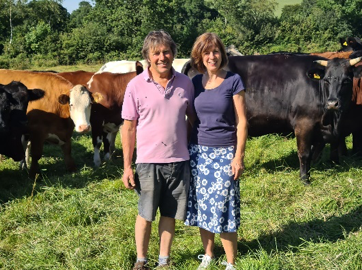Northcott Farm
- Tamar Valley Food Hubs
- Jul 15, 2020
- 4 min read
Updated: Jul 25, 2020
This week we're welcoming Northcott Farm to the Food Hubs, with boxes of their organic, 100% grass fed beef available to order from this weekend.
A third generation farmer, Martin Howard has farmed near Boyton in the Tamar Valley all his life and has been a tenant on the Coodes Estate since 1980. With Northcott Farm situated right on the banks of the river Tamar, Martin views the land he manages and the farming system he employs as part of an interdependent catchment ecosystem which connects Bude in the north to Plymouth in the south. Indeed, Martin’s philosophical approach to farming is based on a belief that the wellbeing of the animals, the land, the environment and human beings are all interconnected. And the crucial factor linking all this together is careful soil and grassland management; or as he prefers to call it ‘just old fashioned no nonsense good farming practice’.
Whilst Northcott Farm is a registered organic farm, Martin does not believe a rigid ‘one way of doing things’ or ‘a cult’ is the way forward for a sustainable farming industry; more a set of working principles which farmers, from both organic and non-organic systems, should look to follow. What he is convinced about is that grass fed animals (not feeding on cereals/corn) reared using minimal or no antibiotics are beneficial for human health following the old adage ‘you are what you eat’. Research undertaken by The Pasture Fed Livestock Association suggests there is increasing evidence of the benefits to humans of eating pasture-raised and grass-fed meat. Particular benefits cited include lower total fat content but higher levels of ‘good fats’ such as omega-3, higher vitamin levels, particularly vitamins A (β-carotene) and E(α-tocopherol) and higher mineral levels.
The farming system at Northcott Farm is centred on raising beef animals on a 100% grass fed diet using a grazing husbandry technique which involves moving the animals frequently from paddock to paddock. The idea is to avoid grazing the grass too tight so it can regenerate quickly using sunlight, whist also allowing the animals to tread some of the grass into the ground to add fertility, moisture and structure to the soil.
Gardeners will know leaving grass clippings on the lawn and not cutting too low will have a similar effect. This mobile grazing system mimics how North American bison herds used to graze the prairies which were prolific grassland habitats pre the arrival of western settlers. Other animals benefit from the longer grass on the farm with brown hares being a common site across the farm which sadly have become a rare sight in many parts of the Westcountry in recent decades.
Another feature of grassland management at Northcott is the use of a diverse sward of traditional grass, legumes and herb species such as timothy, cocksfoot, white and red clover, plantain and chicory amongst others. These are oversown into grass leys rather than using the plough to avoid inverting the soil and losing carbon to the atmosphere. Crucially, these traditional grass/herbal species are capable of sending roots deep into the soil enabling the plant to access organic nutrients which modern shallow rooting grass leys are far less able to reach. Another advantage of deep rooting species is that they are able to improve the permeability of soils to rainfall, thereby helping to reduce runoff and associated flood risk which is becoming an increasing problem across the UK. On a practical note, Martin’s system has resulted in the virtual elimination of anthelmintic usage, with herb rich diets tackling problems such a gut worm where anthelmintic had been the go to remedy previously.
By feeding the soil with organic material, Martin is working with various scientific institutes such as Reading University, Rothamsted Research and the University of Washington to increase and measure the carbon content of his soil. Numerous research studies have conclusively demonstrated that soil carbon has been significantly depleted over the last two centuries in most parts of the world. This is concerning because carbon is a crucial food source for soil microbes such as fungi, bacteria and earth worms which collectively enable grass or any other plant (wheat, barley etc) to access nutrients from the soil i.e. plants cannot grow without soil carbon. It is also important to note that carbon rich soils have a huge role to play in locking up carbon from the atmosphere which is crucial for managing global warming.
Learning more about how to raise livestock sustainably and profitably (an annual rent needs to be paid to the landlord) has motived Martin to take education very seriously within the day-to-day time constraints of running a busy farm. He is founder and chairman of the Tamar Valley Organic Group (open to all farmers not just organic) which was established to enable local farmers to share knowledge and work with technical providers. He has worked very closely for a number of years with Graham Harvey, educator and script writer for ‘The Archers’ radio programme (see a short film ‘Farming without Chemicals’ here).
Engaging the public in a debate around food production and consumption is core to Martin’s mission going forward and he is only too keen to invite individuals, families or wider groups onto the farm to help build mutual understanding between producers and consumer. Please do not hesitate to contact Martin for a farm visit by emailing martin.howard@mypostoffice.co.uk or calling 07880 556 488.









Comments